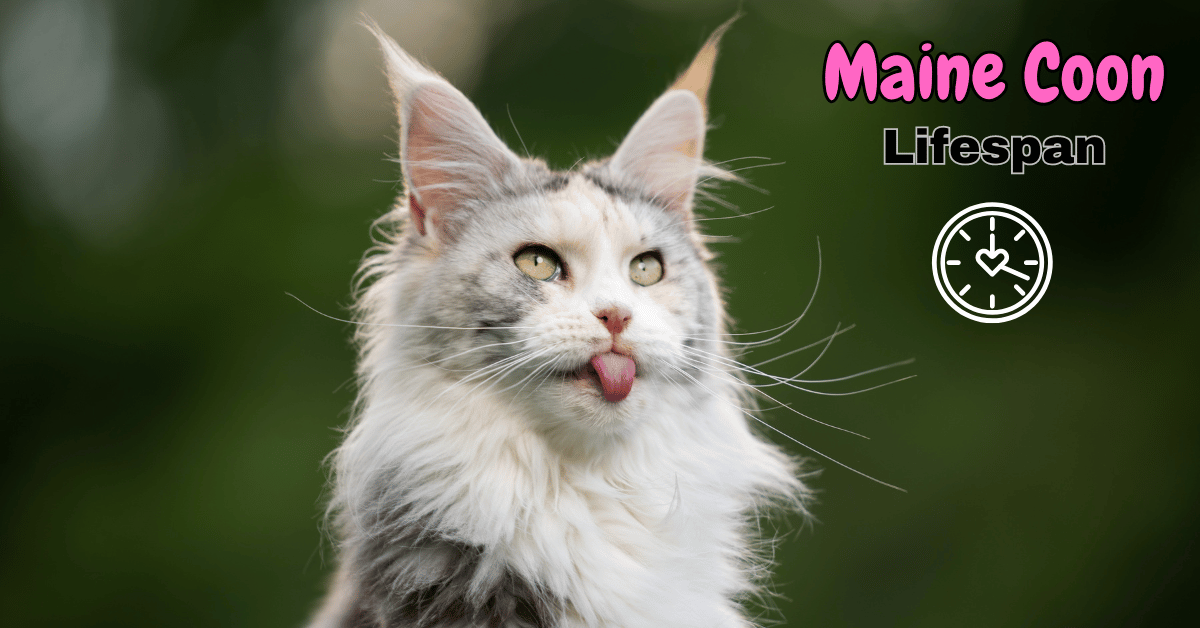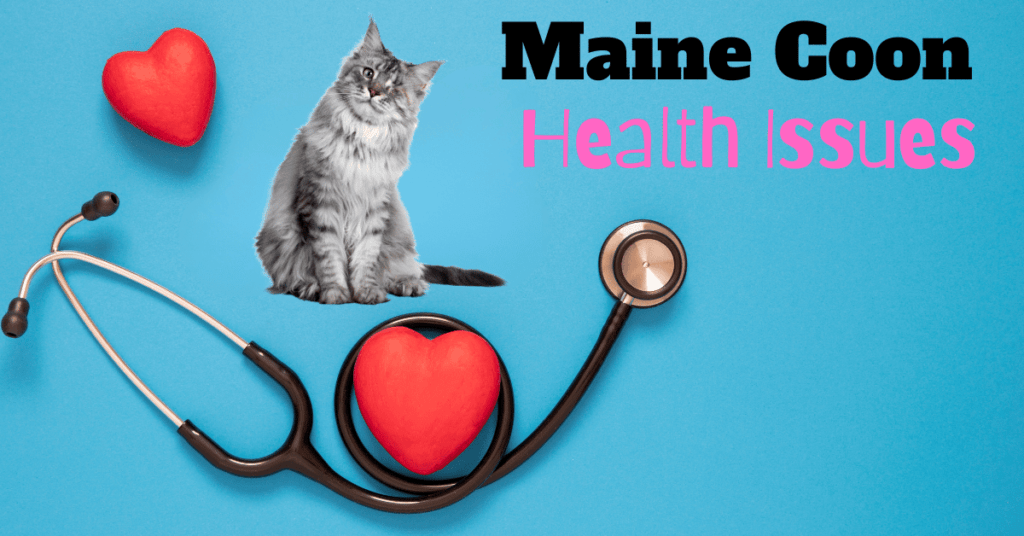This post contains affiliate links and I will be compensated if you make a purchase after clicking on my links.
Introduction: Revealing the Lifespan of Maine Coon Cats
Maine Coon cats aren’t just fluffy showstoppers—they bring a whole lot of heart to any cat lover’s life. When it comes to longevity, Maine Coons are often described with a “technical” lifespan ranging from 12 to 15 years.
However, talk to any Maine Coon enthusiast, and you’ll hear tales of these furry behemoths clocking in two decades and beyond, with some reaching the ripe old age of 25 or even more.
Fact: The oldest recorded Maine Coon was the incredible Rubble, who lived to a staggering 31 years! Not only was he the oldest Maine Coon, but he was also one of the oldest cats in the world!
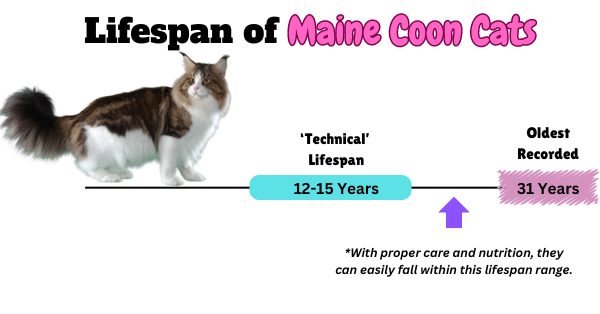
The Life Stages of Maine Coon Cats
Understanding the various life stages of Maine Coon cats can help you provide the best care at each phase of their lives and significantly extend their lifespan. From playful kittens to dignified seniors, each stage has its own unique needs and characteristics. Here’s a detailed look at the seven life stages of a Maine Coon cat:
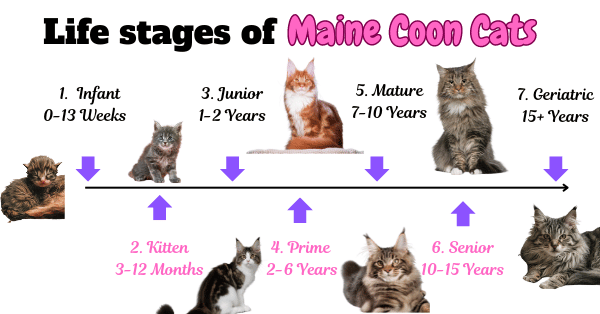
1. Infants (0-13 Weeks)
During the infant stage, Maine Coon kittens are much more dependent on their mother and human caregivers. Born from a litter, they are typically delivered to their new owners around 12 weeks of age.
At this point, they are just beginning to eat solid food and need plenty of care and attention to ensure they are healthy and well-adjusted. This stage is crucial for socialization and building trust with their new human family.
2. Kittenhood (3-12 Months)
Kittenhood is a time of rapid growth and endless curiosity. During this period, Maine Coon kittens learn to navigate the world around them and understand their place in it. Socialization is key, as they need to become comfortable with grooming, handling, and transportation. By the end of this stage, they will have reached about 90% of their adult size, making it an essential time for proper nutrition and care.
3. Junior Phase (1-2 Years)
As they transition into the junior phase, Maine Coons begin to shed their kitten-like behaviors and develop into more mature cats. This phase is akin to the teenage years in humans.
They reach sexual maturity and make the switch from kitten food to adult food. Despite their increased maturity, they may still be growing slowly and developing their full physical and psychological capabilities.
Tip: Female Maine Coons should wait until they’re at least a year old and have had at least two oestrus cycles before they start their journey into motherhood.
4. Prime Maine Coon (2-6 Years)
The prime years are when your Maine Coon cat is at the peak of their physical condition, and they should stop growing by 4 to 5 years of age.
Comparable to a human in their twenties to thirties, this stage is marked by defined personality traits and established temperaments. Regular checkups, a healthy diet, and consistent grooming are essential to maintain their health and well-being during this vibrant period of their lives.
5. Mature Maine Coon (7-10 Years)
In the mature phase, Maine Coons begin to slow down. They may spend more time indoors and their activity levels decrease. It’s important to monitor their health closely, as they are more prone to developing health issues. Regular checkups become crucial, and their diet may need to be adjusted to prevent weight gain due to decreased physical activity.
6. Senior Maine Coon (10-15 Years)
Entering the senior stage, Maine Coons are similar to humans in their sixties. Physical activity drops significantly, and they may experience aches and pains. Their fur may lose its glossy appearance, and health monitoring becomes even more critical.
Issues like loss of bodily functions, memory problems, or signs of arthritis can emerge, requiring more attentive care from their owners.
7. Geriatric (Over 15 Years)
In the geriatric stage, Maine Coons will slow down considerably and require a lot more help from their human companions. Their physical activity is minimal, and they may prefer softer foods as chewing hard kibble becomes challenging.
This stage is marked by increased vulnerability to serious illnesses like kidney problems or heart issues. Providing a comfortable, stress-free environment is essential to ensure their remaining years are as happy and healthy as possible.
What Factors Influence the Lifespan of Maine Coon Cats?
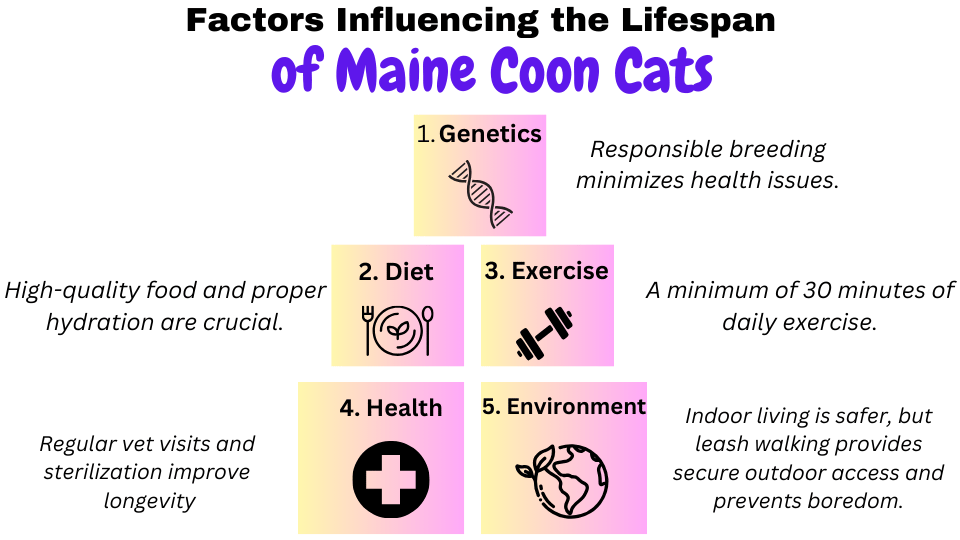
Genetics and Predispositions
Maine Coons are a breed apart—quite literally! These cats reach their full majestic size only around four or five years old, much later than their smaller feline counterparts.
This slow march to maturity is more than just a party trick; it plays a significant role in their overall health and longevity. This genetic predisposition means that while Maine Coons might be late bloomers, they pack a lot of life into those years.
However, this trait also requires careful monitoring for potential health issues related to their size, such as joint problems or the delayed onset of genetic diseases.
Healthcare and Vigilance
For Maine Coon cats, age is more than just a number—it’s a cue for enhanced vigilance. Regular checkups are always important, but as they get older, you need to increase the frequency and ensure they are up to date on their vaccinations. Starting around 15 years old, it’s wise to shift from regular to quarterly health checks.
This isn’t just about catching up on the latest gossip with your vet; these frequent visits can catch the early whispers of conditions like diabetes or thyroid issues, which can wreak havoc if left unchecked. Early detection is key to managing these conditions and can significantly extend the quality and duration of your Maine Coon’s life.
Nutrition & Diet
Let’s talk turkey—and chicken, and fish. Diet is a cornerstone of any cat’s health, but for the Maine Coon, getting nutrition right is as crucial as their morning stretch.
Given their larger size and the slow pace at which they grow, Maine Coons require a diet that supports not just their immediate energy needs but their long-term health. A balanced diet tailored to their specific needs helps mitigate the risk of obesity, supports joint health, and fuels their rather substantial day-to-day activities. It’s not just about feeding them more, but about feeding them right.
Physical Activity and Mental Stimulation
Exercise is essential for maintaining the health and happiness of your Maine Coon. As they age, activities like leash walking can be particularly beneficial, helping to keep their joints flexible and their weight in check.
Aim for at least 30 minutes of physical activity each day. Additionally, providing new toys and varying their play environment can stave off boredom and keep their minds sharp.
Life enrichment activities such as interactive play sessions, puzzle feeders, and regular interaction with you are vital to their well-being. A dynamic environment and plenty of love and attention are key to ensuring your Maine Coon lives a long, happy life.
Common Health Challenges in Maine Coons
Heart Health
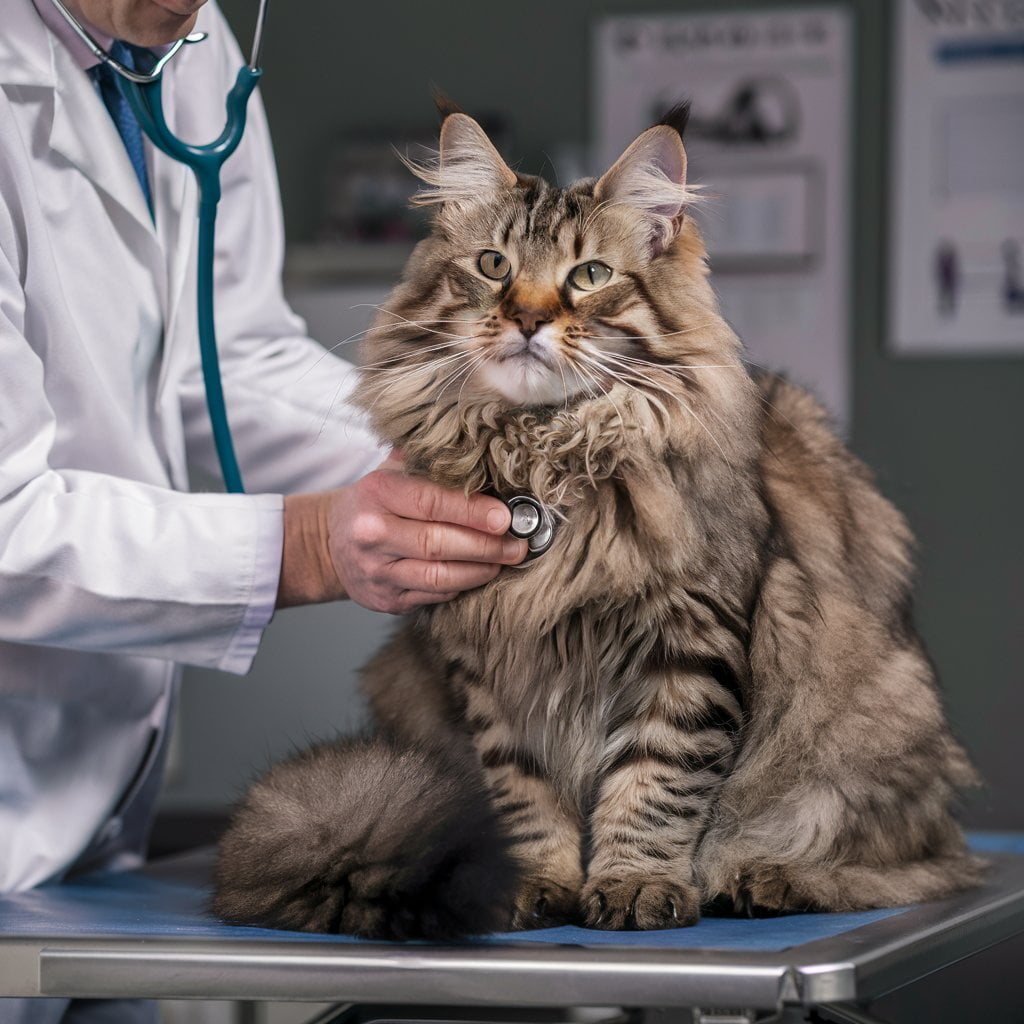
When it comes to heart matters, Maine Coons can unfortunately be a bit more burdened than your average tabby. Their grandeur isn’t just skin deep—it extends to their heart as well.
Hypertrophic cardiomyopathy, a condition where the heart muscle thickens, is notably prevalent among these large cats. This ailment isn’t just a heartbreaker for owners; it can significantly impact the quality and length of a Maine Coon’s life.
Joint Health
Imagine carrying around a few extra pounds (we all do post-holiday season, right?), but instead of shedding it, you grow into it—slowly. That’s the life of a Maine Coon. They don’t reach their full majestic form until the age of four or five.
This slow growth process puts unique strains on their skeletal system, leading to common issues like hip dysplasia and arthritis. Early and continuous monitoring of these gentle giants is crucial to manage these conditions, ensuring they can leap onto our beds (and into our hearts) with ease.
Obesity
Given their larger size, Maine Coons are susceptible to obesity, which can exacerbate other health issues like diabetes and joint problems. A balanced diet and regular exercise are essential to keep their weight in check. Using puzzle feeders and engaging them in active play can help maintain their ideal body weight.
Other Common Diseases
In addition to hypertrophic cardiomyopathy and hip dysplasia, Maine Coons can be prone to other genetic conditions such as polycystic kidney disease (PKD) and spinal muscular atrophy (SMA). Regular screening for these conditions can help manage and mitigate their impact on your cat’s health and lifespan.
Conclusion: Understanding the Lifespan of Maine Coon Cats
The lifespan of a Maine Coon is influenced by a tapestry of factors, from their royal genes to the size of their hearts and the care they receive. By understanding these aspects, Maine Coon parents can better prepare to provide a life that’s as large and fulfilling as the cats themselves.
Encouraging comprehensive care and enrichment is more than just a responsibility; it’s an opportunity to extend those precious years with your furry family member. Investing in the right environment, healthcare, and diet isn’t just good practice—it’s a way to possibly beat the averages and enjoy a longer, happier journey together. So, here’s to hoping your Maine Coon not only lives a long life but sets new records—maybe even reaching the big three-o!
Meet Sean, a fintech whiz with a penchant for pet purrs and blockchain buzz. After a decade of fintech feats, Sean’s tech talents leaped from ledger lines to litter lines, driven by a passion for pets and a vision for a more connected pet care community. With three critter companions as co-pilots, Sean launched this blog to share a treasury of pet-friendly tech tips and tales.

